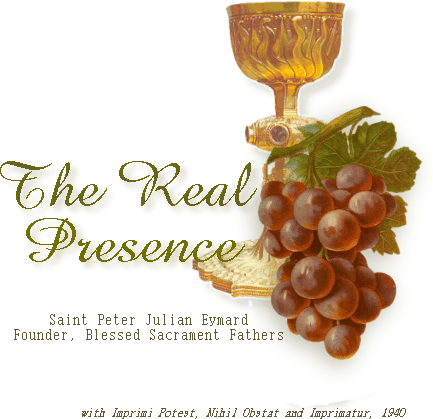 FAITH IN THE EUCHARIST Qui credit in Me, habet vitam aeternam. He that believeth in Me, hath everlasting life. (John vi. 47.) HOW happy we would be if we had a lively faith in the Most Blessed Sacrament! For the Eucharist is the royal truth of faith; it is the virtue and sovereign act of love, the whole of religion in action. Si scires donum Dei! Oh! if we but knew the gift of God! But belief in the Eucharist is a treasure we must seek by submissiveness, preserve by piety, and defend at any cost. Not to believe in the Blessed Sacrament is the greatest of misfortunes. I FIRST of all, is it possible for one who formerly believed and received Communion to lose all faith in the Blessed Sacrament? No, I do not think so. A child may despise his father and insult his mother, but it is impossible for him not to recognize them. In the same way, a Christian cannot deny that he has communicated; he cannot forget that he was happy at least once. Unbelief in the Eucharist is never a result of the evidence of the reasons advanced against this mystery. Suppose that a man, immersed in temporal affairs, has allowed his faith to grow torpid, to lie dormant. He has forgotten; but let the grace of God arouse him, the ordinary grace of conversion, and he will instinctively come back to the Eucharist first of all. Passions that dominate the heart are another source of unbelief. A passion that wants to have its own way knows no mercy. When fully gratified, it scorns the object of its pleasure; when attacked, it denies. "How long is it," we may ask, "since you have ceased believing in the Eucharist?" And by tracing this loss of faith to its source, we find a weakness, an evil impulse which he did not have the courage to resist. A faith that has gone on weakening and doubting over a long period of time is another source of unbelief. The sight of so many who are indifferent and live like unbelievers scandalizes us. The crafty arguments and sophisms drummed into our ears by a false science are also an object of scandal. Why does our Lord let these things go unpunished? Why does He allow Himself to be insulted if He is there? So many unbelievers are honest people! That is the kind of wavering faith that leads one to a loss of belief in the Eucharist. An untold misfortune indeed! For then, like the Capharnaumites, we separate ourselves from Him Who has the words of truth and life. II WHAT are the consequences of unbelief in the Eucharist? It is a denial of the power of God. What! God is present under this mean appearance? It is impossible, and who can believe it? The unbeliever accuses Jesus Christ of falsehood, for our Savior said: "This is My Body. This is My Blood." He despises our Lord's goodness, like the disciples who, on hearing the Eucharistic promise, "went back and walked no more with" their Divine Master. Moreover, his faith in the other mysteries will soon be shaken and destroyed. If he does not believe in this living Mystery, the truth of which is confirmed by an actual fact, in what mystery will he believe? His virtue will soon become sterile; it is deprived of its natural food; it no longer associates with Jesus Christ from Whom it drew all its vigor; it loses sight of Jesus, its living Model, and forgets Him. His piety dries up almost immediately; it has lost its center of life and affection. Consequently, he is without consolation in the trials of life, and if his tribulations become too great, he falls into despair. A sorrow that cannot find an outlet into the heart of a friend soon becomes overwhelming. III LET us then believe in the Eucharist. "I believe, Lord," we should often say. "Help my tottering faith!" There is nothing that gives greater glory to our Lord than this act of faith in His Eucharistic presence. It honors His Divine truthfulness in a supereminent fashion; the greatest honor that can be offered any man is to believe him on his word, just as the greatest insult would be to suspect him of lying, to doubt his word, and to demand a proof or a guarantee. Now, if a child believes his father on his word, a servant his master, a subject his king, why not believe Jesus Christ on His word when He declares with an oath that He is present in the Most Blessed Sacrament? This simple and absolute act of faith in the word of Jesus Christ gives Him glory because it pays Him the homage of recognition and adoration in His hidden state. The honor paid to a friend in disguise, or to a king without his royal insignia, is greater than any other, because it is really the person who is then honored and not his trappings. So it goes with Jesus in the Most Blessed Sacrament; to honor Him, to believe in His Divinity in spite of the veil of weakness thrown over Him is to honor His Divine Person and to respect the mystery which envelops Him. Such an act of faith adds to our merit. Like Peter confessing the Divinity of the Son of man, like the Good Thief declaring the innocence of the Crucified, we proclaim Jesus Christ to be what He really is in spite of what He seems to be. Still more, we believe the opposite of what our senses tell us, relying solely on the truth of His infallible word. Let us believe, and believe firmly in the Real Presence of Jesus in the Eucharist! Jesus Christ is there! When we enter a church, a feeling of respect should come upon us, a respect of faith and love on meeting Jesus Christ in person; for it is indeed He Whom we are meeting. Let that be our apostolate, our preaching; it is the most eloquent for the unbelievers and the impious.  Contact Us Contact Us HOME---------------THE HOLY EUCHARIST DIRECTORY-----------------------BLESSED SACRAMENT VISITS www.catholictradition.org/Eucharist/real-presence10.htm |